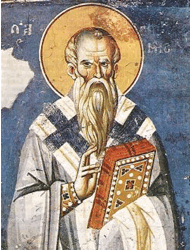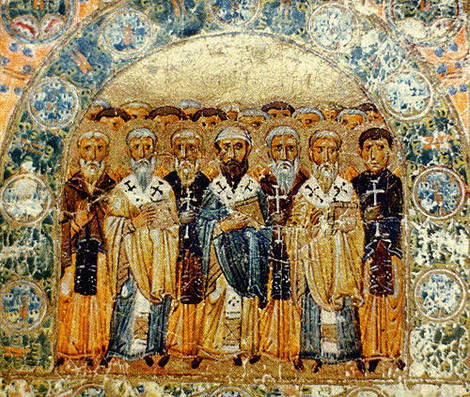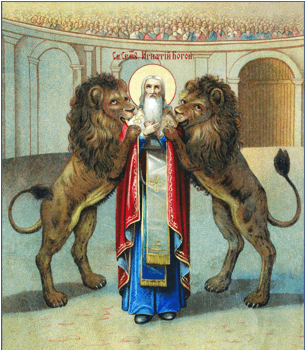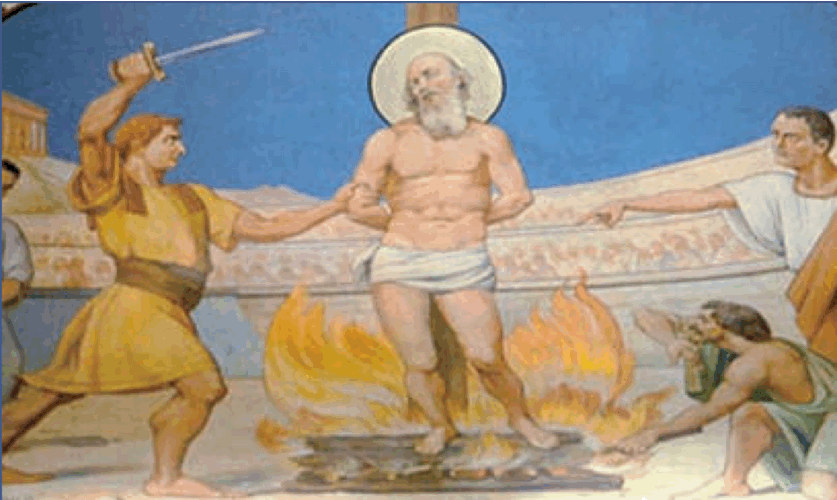 Clement, Eerdman’s 125
Clement, Eerdman’s 125
- Clement of Rome was an arch-deacon
- Perhaps mentioned in Phillipians 4:3
- Martyred under Domitian around 100 AD
CHAPTER I THE SALUTATION. PRAISE OF THE CORINTHIANS BEFORE THE BREAKING FORTH OF SCHISM AMONG THEM
CHAPTER II PRAISE OF THE CORINTHIANS CONTINUED
"Every kind of faction and schism was abominable in your sight."
What a change form the Corinthian church that Paul dealt with!
Does anyone but me think the Corinthians get kicked around more than other NT churches in today's pulpits because of Cessationist theology. Almost all NT chucrches in the epistles and revelation were problem children, but Corinth always seem to get trashed extra hard for their supposed spiritual immaturity."
CHAPTER III THE SAD STATE OF THE CORINTHIAN CHURCH AFTER SEDITION AROSE IN IT FROM ENVY AND EMULATION
CAUSE: "Every kind of honour and happiness was bestowed upon you, and then was fulfilled that which is written, “My beloved did eat and drink, and was enlarged and became fat, and kicked.” "
EFFECT: "Hence flowed emulation and envy, strife and sedition, persecution and disorder, war and captivity. So the worthless rose up against the honoured, those of no reputation against such as were renowned, the foolish against the wise, the young against those advanced in years. For this reason righteousness and peace are now far departed from you, inasmuch as every one abandons the fear of God, and is become blind in His faith, neither walks in the ordinances of His appointment, nor acts a part becoming a Christian, but walks after his own wicked lusts, resuming the practice of an unrighteous and ungodly envy, by which death itself entered into the world."
CHAPTER IV MANY EVILS HAVE ALREADY FLOWED FROM THIS SOURCE IN ANCIENT TIMES
"Ye see, brethren, how envy and jealousy led to the murder of a brother. Through envy, also, our father Jacob fled from the face of Esau his brother. Envy made Joseph be persecuted unto death, and to come into bondage. Envy compelled Moses to flee from the face of Pharaoh king of Egypt, when he heard these words from his fellow-countryman, “Who made thee a judge or a ruler over us? wilt thou kill me, as thou didst kill the Egyptian yesterday?” On account of envy, Aaron and Miriam had to make their abode without the camp. Envy brought down Dathan and Abiram alive to Hades, through the sedition which they excited against God’s servant Moses. Through envy, David underwent the hatred not only of foreigners, but was also persecuted by Saul king of Israel."
CHAPTER V NO LESS EVILS HAVE ARISEN FROM THE SAME SOURCE IN THE MOST RECENT TIMES. THE MARTYRDOM OF PETER AND PAUL
"But not to dwell upon ancient examples, let us come to the most recent spiritual heroes. Let us take the noble examples furnished in our own generation. Through envy and jealousy, the greatest and most righteous pillars [of the Church] have been persecuted and put to death. Let us set before our eyes the illustrious apostles. Peter, through unrighteous envy, endured not one or two, but numerous labours and when he had at length suffered martyrdom, departed to the place of glory due to him. Owing to envy, Paul also obtained the reward of patient endurance, after being seven times thrown into captivity, compelled to flee, and stoned. After preaching both in the east and west, he gained the illustrious reputation due to his faith, having taught righteousness to the whole world, and come to the extreme limit of the west, and suffered martyrdom under the prefects. Thus was he removed from the world, and went into the holy place, having proved himself a striking example of patience."
CHAPTER VI CONTINUATION. SEVERAL OTHER MARTYRS
CHAPTER VII AN EXHORTATION TO REPENTANCE
CHAPTER VIII CONTINUATION RESPECTING REPENTANCE
CHAPTER IX EXAMPLES OF THE SAINTS
CHAPTER X CONTINUATION OF THE ABOVE
"Abraham, styled “the friend,” was found faithful, inasmuch as he rendered obedience to the words of God. He, in the exercise of obedience, went out from his own country, and from his kindred, and from his father’s house, in order that, by forsaking a small territory, and a weak family, and an insignificant house, he might inherit the promises of God."
CHAPTER XI CONTINUATION. LOT
"For Lot’s wife, who went forth with him, being of a different mind from himself and not continuing in agreement with him [as to the command which had been given them], was made an example of, so as to be a pillar of salt unto this day. This was done that all might know that those who are of a double mind, and who distrust the power of God, bring down judgment on themselves and become a sign to all succeeding generations."
CHAPTER XII THE REWARDS OF FAITH AND HOSPITALITY. RAHAB
CHAPTER XIII AN EXHORTATION TO HUMILITY
"By this precept and by these rules let us establish ourselves, that we walk with all humility in obedience to His holy words. For the holy word saith, 'On whom shall I look, but on him that is meek and peaceable, and that trembleth at My words?'"
CHAPTER XIV WE SHOULD OBEY GOD RATHER THAN THE AUTHORS OF SEDITION
"For we shall incur no slight injury, but rather great danger, if we rashly yield ourselves to the inclinations of men who aim at exciting strife and tumults, so as to draw us away from what is good."
CHAPTER XV WE MUST ADHERE TO THOSE WHO CULTIVATE PEACE, NOT TO THOSE WHO MERELY PRETEND TO DO SO
CHAPTER XVI CHRIST AS AN EXAMPLE OF HUMILITY
"Our Lord Jesus Christ, the Sceptre of the majesty of God,"
CHAPTER XVII THE SAINTS AS EXAMPLES OF HUMILITY
CHAPTER XVIII DAVID AS AN EXAMPLE OF HUMILITY
CHAPTER XIX IMITATING THESE EXAMPLES, LET US SEEK AFTER PEACE
CHAPTER XX THE PEACE AND HARMONY OF THE UNIVERSE
CHAPTER XXI LET US OBEY GOD, AND NOT THE AUTHORS OF SEDITION
"Let us rather offend those men who are foolish, and inconsiderate, and lifted up, and who glory in the pride of their speech, than [offend] God."
"Let your children be partakers of true Christian training; let them learn of how great avail humility is with God—how much the spirit of pure affection can prevail with Him—how excellent and great His fear is, and how it saves all those who walk in it with a pure mind."
"His breath is in us; and when He pleases, He will take it away."
CHAPTER XXII THESE EXHORTATIONS ARE CONFIRMED BY THE CHRISTIAN FAITH, WHICH PROCLAIMS THE MISERY OF SINFUL CONDUCT
CHAPTER XXIII BE HUMBLE, AND BELIEVE THAT CHRIST WILL COME AGAIN
CHAPTER XXIV GOD CONTINUALLY SHOWS US IN NATURE THAT THERE WILL BE A RESURRECTION
CHAPTER XXV THE PHOENIX AN EMBLEM OF OUR RESURRECTION
"Let us consider that wonderful sign [of the resurrection] which takes place in Eastern lands, that is, in Arabia and the countries round about. There is a certain bird which is called a phoenix. This is the only one of its kind, and lives five hundred years. And when the time of its dissolution draws near that it must die, it builds itself a nest of frankincense, and myrrh, and other spices, into which, when the time is fulfilled, it enters and dies. But as the flesh decays a certain kind of worm is produced, which, being nourished by the juices of the dead bird, brings forth feathers. Then, when it has acquired strength, it takes up that nest in which are the bones of its parent, and bearing these it passes from the land of Arabia into Egypt, to the city called Heliopolis. And, in open day, flying in the sight of all men, it places them on the altar of the sun, and having done this, hastens back to its former abode. The priests then inspect the registers of the dates, and find that it has returned exactly as the five hundredth year was completed."
But as the flesh decays a certain kind of worm is produced, which, being nourished by the juices of the dead bird, brings forth feathers. Then, when it has acquired strength, it takes up that nest in which are the bones of its parent, and bearing these it passes from the land of Arabia into Egypt, to the city called Heliopolis. And, in open day, flying in the sight of all men, it places them on the altar of the sun, and having done this, hastens back to its former abode. The priests then inspect the registers of the dates, and find that it has returned exactly as the five hundredth year was completed."
CHAPTER XXVI WE SHALL RISE AGAIN, THEN, AS THE SCRIPTURE ALSO TESTIFIES
"Do we then deem it any great and wonderful thing for the Maker of all things to raise up again those that have piously served Him in the assurance of a good faith, when even by a bird He shows us the mightiness of His power to fulfil His promise?"
CHAPTER XXVII IN THE HOPE OF THE RESURRECTION, LET US CLEAVE TO THE OMNIPOTENT AND OMNISCIENT GOD
CHAPTER XXVIII GOD SEES ALL THINGS: THEREFORE LET US AVOID TRANSGRESSION
CHAPTER XXIX LET US ALSO DRAW NEAR TO GOD IN PURITY OF HEART
"For thus it is written, 'When the Most High divided the nations, when He scattered the sons of Adam, He fixed the bounds of the nations according to the number of the angels of God.'"
| Deuteronomy 3:8-92, Hebrew | Deuteronomy 3:8-92, Septuagint |
|---|---|
|
8 When the Most High gave the nations their inheritance, when he divided all mankind, he set up boundaries for the peoples according to the number of the sons of Israel. 9 For the Lord’s portion is his people, Jacob his allotted inheritance. |
‘8 When the Most High divided the nations, when He scattered the sons of Adam, He fixed the bounds of the nations according to the number of the angels of God. 9 His people Jacob became the portion of the Lord, and Israel the lot of His inheritance’ [ |
The Septuagint states there are territorial angels. Is it a bridge too far that suggest that modern charismatics and Frank Peretti may be right in suggesting there are evil territorial spirits?
CHAPTER XXX LET US DO THOSE THINGS THAT PLEASE GOD, AND FLEE FROM THOSE HE HATES, THAT WE MAY BE BLESSED
"Let our praise be in God, and not of ourselves; for God hateth those that commend themselves."
"Let testimony to our good deeds be borne by others, as it was in the case of our righteous forefathers."
CHAPTER XXXI LET US SEE BY WHAT MEANS WE MAY OBTAIN THE DIVINE BLESSING
CHAPTER XXXII WE ARE JUSTIFIED NOT BY OUR OWN WORKS, BUT BY FAITH
CHAPTER XXXIII BUT LET US NOT GIVE UP THE PRACTICE OF GOOD WORKS AND LOVE. GOD HIMSELF IS AN EXAMPLE TO US OF GOOD WORKS
CHAPTER XXXIV GREAT IS THE REWARD OF GOOD WORKS WITH GOD. JOINED TOGETHER IN HARMONY, LET US IMPLORE THAT REWARD FROM HIM
CHAPTER XXXV IMMENSE IS THIS REWARD. HOW SHALL WE OBTAIN IT?
CHAPTER XXXVI ALL BLESSINGS ARE GIVEN TO US THROUGH CHRIST
CHAPTER XXXVII CHRIST IS OUR LEADER, AND WE HIS SOLDIERS
CHAPTER XXXVIII LET THE MEMBERS OF THE CHURCH SUBMIT THEMSELVES, AND NO ONE EXALT HIMSELF ABOVE ANOTHER
Let him that is pure in the flesh not grow proud of it, and boast, knowing that it was another who bestowed on him the gift of continence.
CHAPTER XXXIX THERE IS NO REASON FOR SELF-CONCEIT
CHAPTER XL LET US PRESERVE IN THE CHURCH THE ORDER APPOINTED BY GOD
CHAPTER XLI CONTINUATION OF THE SAME SUBJECT
CHAPTER XLII THE ORDER OF MINISTERS IN THE CHURCH
CHAPTER XLIII MOSES OF OLD STILLED THE CONTENTION WHICH AROSE CONCERNING THE PRIESTLY DIGNITY
CHAPTER XLIV THE ORDINANCES OF THE APOSTLES, THAT THERE MIGHT BE NO CONTENTION RESPECTING THE PRIESTLY OFFICE
Our apostles also knew, through our Lord Jesus Christ, and there would be strife on account of the office of the episcopate. For this reason, therefore, inasmuch as they had obtained a perfect fore-knowledge of this, they appointed those [ministers] already mentioned, and afterwards gave instructions, that when these should fall asleep, other approved men should succeed them in their ministry. We are of opinion, therefore, that those appointed by them, or afterwards by other eminent men, with the consent of the whole Church, and who have blamelessly served the flock of Christ in a humble, peaceable, and disinterested spirit, and have for a long time possessed the good opinion of all, cannot be justly dismissed from the ministry. For our sin will not be small, if we eject from the episcopate those who have blamelessly and holily fulfilled its duties. Blessed are those presbyters who, having finished their course before now, have obtained a fruitful and perfect departure [from this world]; for they have no fear lest any one deprive them of the place now appointed them. But we see that ye have removed some men of excellent behaviour from the ministry, which they fulfilled blamelessly and with honour.
CHAPTER XLV IT IS THE PART OF THE WICKED TO VEX THE RIGHTEOUS
There you will not find that the righteous were cast off by men who themselves were holy. The righteous were indeed persecuted, but only by the wicked. They were cast into prison, but only by the unholy; they were stoned, but only by transgressors; they were slain, but only by the accursed, and such as had conceived an unrighteous envy against them. Exposed to such sufferings, they endured them gloriously. For what shall we say, brethren? Was Daniel cast into the den of lions by such as feared God? Were Ananias, and Azarias, and Mishael shut up in a furnace of fire by those who observed the great and glorious worship of the Most High? Far from us be such a thought! Who, then, were they that did such things? The hateful, and those full of all wickedness, were roused to such a pitch of fury, that they inflicted torture on those who served God with a holy and blameless purpose [of heart], not knowing that the Most High is the Defender and Protector of all such as with a pure conscience venerate His all-excellent name; to whom be glory for ever and ever. Amen.
CHAPTER XLVI LET US CLEAVE TO THE RIGHTEOUS: YOUR STRIFE IS PERNICIOUS
Your schism has subverted [the faith of] many, has discouraged many, has given rise to doubt in many, and has caused grief to us all. And still your sedition continueth.
CHAPTER XLVII YOUR RECENT DISCORD IS WORSE THAN THE FORMER WHICH TOOK PLACE IN THE TIMES OF PAUL
Take up the epistle of the blessed Apostle Paul. What did he write to you at the time when the Gospel first began to be preached? Truly, under the inspiration of the Spirit, he wrote to you concerning himself, and Cephas, and Apollos, because even then parties had been formed among you. But that inclination for one above another entailed less guilt upon you, inasmuch as your partialities were then shown towards apostles, already of high reputation, and towards a man whom they had approved. But now reflect who those are that have perverted you, and lessened the renown of your far-famed brotherly love.
It is disgraceful, beloved, yea, highly disgraceful, and unworthy of your Christian profession, that such a thing should be heard of as that the most stedfast and ancient Church of the Corinthians should, on account of one or two persons, engage in sedition against its presbyters.
CHAPTER XLVIII LET US RETURN TO THE PRACTICE OF BROTHERLY LOVE
CHAPTER XLIX THE PRAISE OF LOVE
CHAPTER L LET US PRAY TO BE THOUGHT WORTHY OF LOVE
CHAPTER LI LET THE PARTAKERS IN STRIFE ACKNOWLEDGE THEIR SINS
CHAPTER LII SUCH A CONFESSION IS PLEASING TO GOD
CHAPTER LIII THE LOVE OF MOSES TOWARDS HIS PEOPLE
CHAPTER LIV HE WHO IS FULL OF LOVE WILL INCUR EVERY LOSS, THAT PEACE MAY BE RESTORED TO THE CHURCH
CHAPTER LV EXAMPLES OF SUCH LOVE
Many, too, have surrendered themselves to slavery, that with the price which they received for themselves, they might provide food for others.
CHAPTER LVI LET US ADMONISH AND CORRECT ONE ANOTHER
CHAPTER LVII LET THE AUTHORS OF SEDITION SUBMIT THEMSELVES
Ye therefore, who laid the foundation of this sedition, submit yourselves to the presbyters, and receive correction so as to repent, bending the knees of your hearts.
For it is better for you that ye should occupy a humble but honourable place in the flock of Christ, than that, being highly exalted, ye should be cast out from the hope of His people.
CHAPTER LVIII BLESSINGS SOUGHT FOR ALL THAT CALL UPON GOD
CHAPTER LIX THE CORINTHIANS ARE EXHORTED SPEEDILY TO SEND BACK WORD THAT PEACE HAS BEEN RESTORED. THE BENEDICTION

 Ignatius is Probably Best Known for This Quote
Ignatius is Probably Best Known for This Quote
